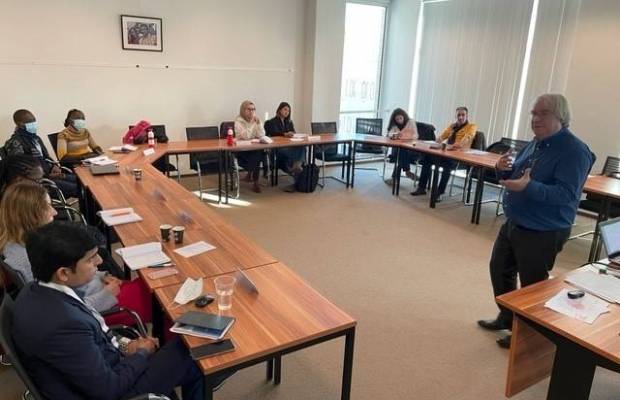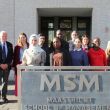Dealing with change - more important than ever
“I love the diversity of cultures that I have found in the classroom. It is great to see that even people from other continents have the same difficulties for improving and similar goals to target. Also, hearing their different opinions makes the program richer, hence it helps you to think out of the box.” These are the words of Norma Fernanda (Colombia) who joined the executive Change Management program which has run in a hybrid format from 8 – 12 November 2021.
The Change Management program, under the lead of Geert Heling, Professor of Organizational Behavior at MSM, brought together 16 professionals from 15 different nationalities. The program is designed to equip professionals with the managerial skills and capabilities to design, build and lead organizational change programs and processes.
Fundamentals of organizational change
On the first day the participants dealt with the fundamentals of organizational change. Professor Heling explained the role of strategy, vision and organizational mission as the main drivers for organizational change. The participants learned how relevant trends and developments are shaping change in organizations and discussed different perspectives on organizational change. Throughout the day, the participants were challenged to connect the course content with their own experiences, in several exercises.
Diagnostic tools
The next day, Professor Heling explained the importance of diagnostic tools to identify the problems and causes of an organization and thus the need for change. They learned about how the choice and application of diagnostic tools can affect a change effort and how to apply diagnostic tools in different change situations.
Culture and mindset
The third day started with a discussion on the role of organizational culture in creating readiness for a change project. An organization’s culture consists of shared beliefs and values and effects all aspects of an organization. If a change strategy is not closely aligned with the culture of an organization, leading a successful organizational change is not easy. In the afternoon, the critical role of an mindset was discussed to embrace change and continuous improvement.
Change dynamics
On the fourth day, the participants learned about the different phases in transforming an organization’s culture. One of the most important aspects of a change management process is the resistance to change. Professor Geert Heling explained that resistance is a natural response , and it is important for a change manager to recognize and manage resistance in order to implement change effectively.
Implementing change
The program concluded with the design and implementation of a successful change program. The participants presented the results of their assignment. Noud de Lang (Netherlands) experienced the practical approach of the program as very useful: “This program was very practically oriented with lots of real-life examples and not just “dry” theories, definitions and processes. All this is making it a very useful 5 days down-to-earth course.“
Also for Norma the program has been very valuable: “After the pandemic appeared, change was in the air. Organizations had to find a way to stay in the market. I am working in an NGO who has the mission to improve food safety among vulnerable people. The isolations during the pandemic affected the most vulnerable people so we had to double our operations. I was wondering how to manage this change effectively and without putting too much pressure on our team. Then I saw this program and though that this might be the answer. And indeed, it was.”
Noud enjoyed being part of such a multicultural environment “This training has been the most diverse and multicultural group I ever attended, even though I work in a company with 28 (European) nationalities. This setting with participants from South-America, Africa and Asia was an extremely nice add-on. Through the case discussions one gets a nice inside in the challenges of those not working in the European arena, which makes the course more than just a course on Change Management, it also puts the challenges ahead of us in perspective. Overall, l much appreciated!” Professor Geert Heling received a lot of compliments about the way he delivered the program: “He is an expert, a thought-provoking teacher. He has the ability to show you the tools and the process of managing change in an organization through easy examples. His added value is definitely his expertise. He is able to identify and understand the problems and to offer solutions to the challengers we are facing during the times of change.” Said Norma.
Professor Geert Heling received a lot of compliments about the way he delivered the program: “He is an expert, a thought-provoking teacher. He has the ability to show you the tools and the process of managing change in an organization through easy examples. His added value is definitely his expertise. He is able to identify and understand the problems and to offer solutions to the challengers we are facing during the times of change.” Said Norma.
Marianna Tomkova (Chez Republic) fully agrees with the words of Norma: “Geert Heling shared the theory and used practical examples of challenges, approaches and results of organizations that are going through change. He was careful to include everyone in both the classroom and on Zoom in the discussions and teamwork. He is very well experienced in the topic, and he shares it with great enthusiasm.”
Zinab Albarghathi (Libya) could not agree more: “The lessons of Professor Geert Heling were wonderful; he has high skills in understanding and presenting everyone's ideas from different backgrounds and linking them with the content of the program. I think the participants who were able to join the program on campus were very lucky to interact with him face to face.”
Professor Geert Heling himself enjoyed teaching such a diverse and enthusiastic group of professionals: “It was a joy to work with this group. Change management is never a one-way approach, therefore it is vital to share views, ideas and experiences. The fact that participants come from different countries, different cultural backgrounds, stimulates the exchange of different perceptions and perspectives. The discussions were rich and valuable. Of course, the focus was constantly on practical applications. The proof of the pudding is in the eating, so the real test will be to put things into practice when back home. I am confident that the participants will do exactly that and take initiative to make things change.“
Due to the Covid-19 pandemic, not all participants were able to travel the Netherlands. For that reason, it was decided to offer the program in a hybrid format which was very much appreciated: “Actually I wanted to take this program in the Netherlands, and live the full experience with fellow classmates. But due to the pandemic conditions and the difficulty of obtaining a visa for the Libyans this unfortunately was not possible. However, the hybrid format has provided me the opportunity to join the program and to benefit from the interaction with all the others from my home. It was really great!” said Zinab.
Would you like to learn how to design, build and lead successful organizational change programs?
Then join our next executive change management program, taking place from 16 – 20 May 2022. Check the website for more information.
About MSM’s executive education programs
Today’s rapidly changing societies and economies demand the most from organizations, leaders, managers and professionals. MSM’s Executive Education programs for emerging markets are developed to achieve a successful and sustainable transformation of both individuals and organizations to support local economic development and business management.

